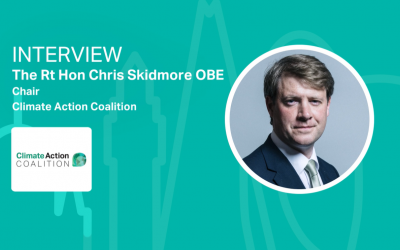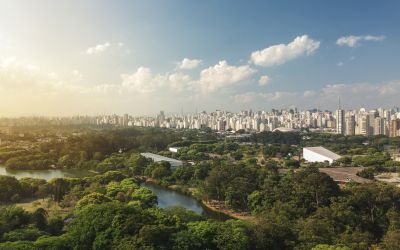Margaret L. Kuhlow on the importance of aligning climate plans & COVID-19 economic recovery packages
Margaret L. Kuhlow, Global Finance Practice Leader, WWF

To mark the 5th anniversary of COP21 and the Paris Agreement, Climate Action caught up with Margaret L. Kuhlow, Global Finance Practice Leader at WWF, to discuss
In your view, what is the single best thing that has been achieved since COP21 in Paris in 2015?
We do have a long way still to go, but there have been several important achievements over the last five years.
First and foremost is the advance of climate science and the widespread awareness and agreement to limit warming of our climate to 1.5°C. Along with the realization of the critical importance of keeping this target, there is growing interest across various sectors in setting a science-based target for their business. In fact, as countries realize they need to step up their Nationally Determined Contributions (NDCs) to meet this 1.5°C target, non-state actors are increasingly stepping up – from business and finance to universities and cities – strongly supported by a growing social movement for change.
What achievement or project have you been most proud of being part of since COP21?
I would highlight two. The first is the Science-based Targets Initiative, which works to help corporations set ambitious climate targets, and now includes guidance for financial institutions to set portfolio targets as well. Along the same lines, the second effort is the UN-convened Net Zero Asset Owner Alliance, the first of its kind alliance of institutional investors – now numbering over 30 members with assets under management over $5 trillion – to set clear targets to align their portfolio with the 1.5°C target, engage their investee companies to decarbonize, and advocate for policy change to enable economy-wide decarbonization.
Outcomes of COP21 placed particular focus on:
- Ensuring increased transparency in the measuring and reporting of greenhouse gas emissions
- The provision of financial resources and technology from developed to developing countries
- The importance of conservation and enhancement of forests and other biological carbon reservoirs
What topic would you like to see focused on at COP26 and why?
Alignment between climate plans and COVID-19 economic recovery packages, including ensuring that recovery packages do not lock-in increased levels of warming with support to high-emitting sectors; rather, such packages should support job-intensive green and blue investment that builds in climate, environment, and social resilience.
A Glasgow Ambition Package/Roadmap that defines clear outcomes including support for both terrestrial and marine nature-based solutions, and charts a clear climate course for the next 5 years and
Ambitious announcements by the finance sector, both public and private, on climate and on the nexus between climate and nature.
What are you most excited about with regard to COP26?
The new geopolitical momentum that seems to be building: the new partnership of China and Europe towards stronger targets; the net zero by 2050 announcements by many countries; and the US returning to the table. And, this new political momentum is supported and pushed ahead by many others – from youth movements like Fridays for Future, to growing corporate and finance sector interest in setting Science Based Targets, to cities pressing ahead to decarbonize buildings and transport.
2020 has been described as the beginning of the ‘decade of change’. However, the Climate Clock suggests we have just over 7 years. Clearly it is Time to Act. But what are your thoughts? Do we have a decade to deliver or is it in fact 7 years?
Whether we have seven years or ten is not what is important. The IPCC has made it clear that emissions need to be halved by 2030, and this needs to be carefully planned, budgeted for, and implemented. What is key is that in 2020, and now 2021, countries have started to put in place the enabling conditions to deliver significant climate action before and after the next cycle of review in 2025, and society is increasingly pushing policy makers to get moving.
What are the three things you think we should prioritise in the next 12 months to ensure we have a chance of meeting 2030 emission reduction targets?
- Net-Zero, 1.5°C aligned Nationally Determined Contributions by all countries
- Science-based Net-Zero Targets for high-emitting sectors
- 1.5°C and nature positive financial portfolio alignment
The world has come so far in the last decade and the next 10 years are a fantastic opportunity to achieve great things. But we must act now and the world must come together in order to meet targets set out in the Paris Agreement. In what ways do you think the world/our day-to-day life will look different in 2030?
World: biodiversity and habitat loss are stabilized and we are bending the curve toward a nature positive world; All countries and Non-State actors have implemented 1.5˚C aligned targets, and are on track to Net-Zero by 2050 with non-hydro renewable energy constituting 40% of global electricity production.
Day to day life: Citizens are making decisions based on their impact on climate and nature, for example, eating planet-based diets, living in One Planet Cities and using electric public transport at scale with virtual work solutions mainstreamed, and climate and nature aligned investment exists at all levels.
What is the one most important thing in your eyes, that needs to be achieved by 2030?
We must address the dual crises of climate change and biodiversity loss to support a healthy home for both nature and people.





_400_250_s_c1.png)
